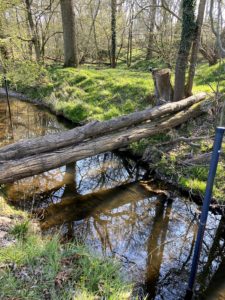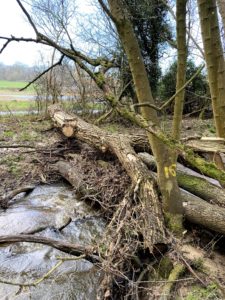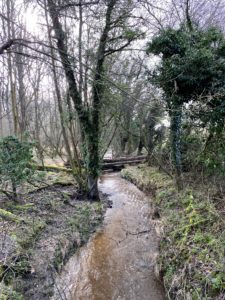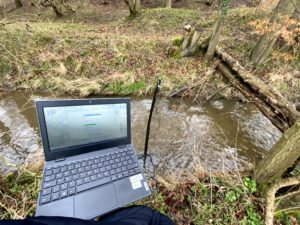Landwise Researcher Gabby Powell describes work on the Lower Pang Leaky Dams Defra Pilot Project



Landwise NFM project partners, the Pang Valley Flood Forum, are carrying out a Defra funded NFM pilot project in the lower Pang Valley, a few miles to the west of Reading. Some 40 leaky dams have been constructed and are being monitoring in the tributaries of the Pang river which joins the Thames at Pangbourne. Key partners include Twenty 65, the Englefield Estate, and the Environment Agency. A video describing this work has recently been released:
University of Reading researcher Gabby Powell explained her role in this and related work for the Landwise project.
“Our research includes following a local flood group, the Pang Valley Forum, who won a Defra grant for a NFM pilot project. Through the co-production of research, incorporating both lay and expert knowledge, I am investigating the role of community partnership and evaluating the design of NFM interventions.”
“As you can see from the video, the work has a strong local support and active collaboration from local landowner Englefield Estate. There is a lot of interest in the locality as 120 homes were flooded downstream in Pangbourne in 2007. The contribution of those who are at risk of flooding is particularly important.”
The research includes assessing the role of community engagement with NFM and how this impacts the perceived responsibility and flood authorities and water companies.
“I will be interviewing people who live near one of the areas under study to better understand their perspective and level of enthusiasm for NFM.”
Gabby described the field investigations: “Monitoring will indicate the efficiency of different types of leaky barriers at slowing the flow of excess water, resulting from rainfall events of different sizes. Additionally, an annual geomorphic survey of the river and leaky barriers is undertaken to evaluate the effect different types of leaky barriers have on the river morphology and the evolution of the leaky barriers themselves.”
“Leaky dams mimic the natural obstruction caused by trees and branches falling into the river. They range from a single large branch to a network of several tree trunks. Only locally sourced trees were used.”
One of the challenges has been the lack of baseline pre-intervention data. Pang Valley Flood Forum faced many challenges getting the project set up once they had won the Defra grant. There were issues around liability and insurance, among others, that needed to be resolved, and they were unsure whether the project could go ahead. The time taken to resolve the issues used up time that would have been used for pre-intervention monitoring. So we have had to adapt the monitoring design to compare upstream and downstream impacts at different scales across the project area.
On findings so far Gabby said: “We are at the early stages of two to three years of data collection. So far, as expected the data indicates that the barriers are proving effective in terms of storage and attenuation and in reducing flood peaks for smaller more frequent storms, although less so for larger events.”
“Leaky dams have many benefits beyond flood mitigation. They are also good for in-stream habitat – trapping sediment which improves water quality and providing habitat for fish through creating pools and cover. The anticipated benefits for biodiversity were a factor that helped attract the Defra funding. Early monitoring results already show benefits for fungi, invertebrates, and birds.”
Explaining links with other Landwise work she explained: “One of the outcomes of the monitoring is that the data will allow for the modelling of the catchment by JBA Consulting to be improved which in turn will help us understand better the impacts of scaling up this type of intervention.”
“In conclusion, I must emphasise the importance of the partnership approach to this work as well as the contribution of my research colleagues in the Landwise team.”
Contact Gabby Powell: g.b.powell@pgr.reading.ac.uk
The Landwise modelling team will be presenting on Modelling NFM in lowland catchments as part our webinar series on 29 July 2021 12:30 – 13:30. Find out more and book for free here.



